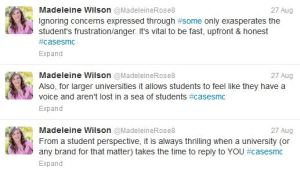This is my first week back to Chapman University as a sophomore and I could not be more excited about it! Right away, I began working with the Interactive Marketing Department in Chapman’s Strategic Marketing and Communication department again. I had this same job last year and absolutely loved it. This year I will be working more hours and start earning more responsibilities. It will definitely be a fun challenge.
What I wanted to touch on was the online discussion via Twitter that my supervisor, Sheri Lehman hosted on Tuesday. She gave me the heads up that she would be leading a Twitter chat as a co-moderator focused on transparency and engagement on social media for higher education establishments. Check out the whole discussion on Storify here. Using the tag #casesmc created by CASE (Council for Advancement and Support of Education), Twitter users were able to jump in on this dynamic hour-long discussion.
I “lurked” on the conversation for the first forty-five minutes, captivated by all of the phenomenal ideas and advice these professionals were posting. Finally, I got the courage to jump in and provide my input from a student’s perspective:
Immediately, I got responses from higher education professionals tuning in on the conversation. They seemed very responsive to the student feedback and instantly engaged with me. I exchanged numerous tweets back and forth and before I knew it, the chat was over.
The main ideas were exactly what I tweeted about – transparency, honesty, and speed of response are absolutely KEY! Many times, students (especially new ones), are too shy to ask questions in person or feel too intimated to confront the administration or staff about a concern. By tweeting out a complaint or recommendation, they maintain some anonymity and hope to receive a response. If the student is not shy, they may just be lazy or try to avoid confrontation. It is much easier to sit behind a computer screen or phone than talk in person. I’m not saying that tweeting concerns or complaints via Twitter is a bad thing – no. It is definitely the most time-efficient way and very effective. IF the university has a quick and honest response. People do not like being ignored. If the university ignores the concern or takes more than 24 hours to reply, the complainer may feel increasingly exasperated and frustrated – making the situation worse. So speed is key. Then also, honesty is vital. Students can see right through a “fake” response. They will automatically sniff out the sugarcoating. Instead of ignoring the issue, try to address it or make a suggestion to better the student’s situation. Finally, a school must be transparent – if they make a mistake, they must own up to it and apologize. Some may say that is a sign of weakness, however it is truly the test of any strong brand. Taking responsibility and being straightforward with their audience is more important that appearing blameless.
This was such a meaningful experience for me. I participated in a professional discussion with people in a field I aspire to be in. Not only did I observe, but I was able to chat, listen, and collaborate. The ability to participate in discussion through social media and connect with people from all over is one of the many things I absolutely adore about online communications. I would not have had this incredible opportunity if it were not for social media. I now have a whole new set of skills I can use and gained a few networking connections simply from this one hour twitter chat.
I would encourage all students to seek out discussions like this one online. Whether it be on a blog, Facebook, or Twitter, there’s always plenty going on online. You just have to have the guts to jump in! I learned so much in that brief amount of time and do not regret taking the plunge one bit.



